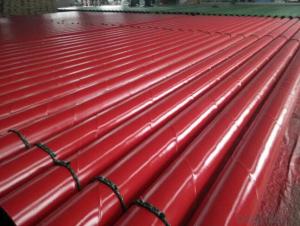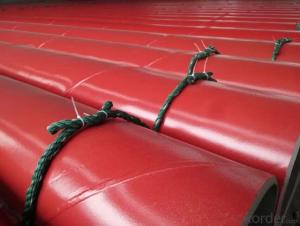seamless 3PE steel pipe external coating
- Loading Port:
- China Main Port
- Payment Terms:
- TT OR LC
- Min Order Qty:
- -
- Supply Capability:
- -
OKorder Service Pledge
OKorder Financial Service
You Might Also Like
Specifications
water pipeline inner-layer tape
1 Butyl rubber as adhesive
2. SGS test report and DVGW certificate
3. corrosion protection
water pipeline inner-layer tape
State-of-the-Art Pipeline Protection for All Climates & Environments
System description:
WATER PIPELINE Inner -layer tape also be called pipe wrap anti-corrosion tape, polyethylene wrap tape.
water pipeline Inner-layer tapeT100 is engineered to assure a high bond to the primed pipe surface with excellent conformability characteristics, aggressive adhesive for corrosion protection and repair of main line coatings.
Inner-layer tapeT100 series is cold applied tape coating system for corrosion protection of Oil, Gas, Petrochemical, and Waste Waterburied pipeline, pipe can be buried, also can be underground ,overhead ,onshore and offshore .
Structure of water pipeline inner wrap tape
The specification of the tape consists of two layers, adhesive layer and film backing
Adhesive: butyl rubber
Film backing: Special blend of stabilized polyethylene
Features & Benefits
Provides a permanent bond to the primed steel pipes surface and provides protection against chemical electrolytic corrosion for underground pipelines.
long term corrosion protection
Worldwide reference lists. Established in-ground history
High chemical resistance under service temperature.
Outstanding electric property and permanent adhesion.
Cold applied, No release liner. Makes installation fast and easy.
Complies with EN-DIN 30672 and AWWAC-214 international standards and also ASTM standards.
Be used for water pipeline corrosion protection
System Properties
Type | T138 | T 150 | T165 | T180 | T 250 | T265 | T280 | |
Thickness | 15mil 0.38mm | 20mil 0.508mm | 25mil 0.635mm | 30mil 0.762mm | 20mil 0.508mm | 25mil 0.635mm | 30mil 0.762mm | |
Backing | 9mil 0.229mm | 9mil 0.241mm | 10mil 0.25mm | 10mil 0.25mm | 15mil 0.38mm | 20mil 0.508mm | 25mil 0635mm | |
Adhesive | 6mil 0.152mm | 11mil 0.279mm | 15mil 0.381mm | 20mil 0.508mm | 5mil 0.127mm | 5mil 0.127mm | 5mil 0.127mm | |
When used for ductile iron pipes inner layer 980-20 or 980-25 and outer layer 955-20 or 955-25 are recommended. | ||||||||
Elongation | ³300% | ³400% | ||||||
Tensile Strength | 55 N/cm | 70 N/cm | ||||||
Color | Black | White | ||||||
Peel Adhesion to Primed Pipe | 33 N/cm | |||||||
Dielectric Strength | 30 KV | |||||||
Dielectric Breakdown | 26 KV/mm | |||||||
Cathodic Disbandment | 0.24 in radius 6.4 mm | |||||||
Water Vapor Transmission Rate | < 0.1% | |||||||
Volume Resistivity | 2.5 x 1015 ohm.cm | |||||||
Impact resistance | 5.5Nm | |||||||
Penetration Resistance | <15% | |||||||
Performance | AWWA C-209,ASTM D 1000,EN 12068 | |||||||
Order information
Length | 100ft(30 M),200ft(60 M),400ft(120 M),800ft(240 M) |
Width | 2’’(50mm),4’’(100mm),6’’(150mm),17’(450mm),32’’(800mm) |
- Q:How are steel pipes connected to other materials like concrete or plastic?
- Steel pipes can be connected to other materials like concrete or plastic through various methods such as welding, flanges, threaded connections, or using specialized fittings. These connections ensure a secure and durable bond between the steel pipe and the other material, allowing for effective transfer of fluids or structural support.
- Q:Can steel pipes be used for cooling systems?
- Yes, steel pipes can be used for cooling systems. Steel pipes are commonly used in various industrial cooling applications due to their durability, high strength, resistance to corrosion, and ability to withstand high pressure and temperature conditions.
- Q:What is the outer diameter and wall thickness of DN40 steel pipe?
- DN40, refers to the diameter of 40mm, that is, an inch and a half, there are welded pipe and galvanized pipe,Ordinary wall thickness 3.5mm wt 3.84kg/mThicken 4.25mm weight 4.58kg/m
- Q:How are steel pipes used in mining?
- Steel pipes are extensively used in mining for various purposes, such as transporting fluids, ventilation systems, and structural support. They are commonly employed for carrying water, slurry, or other liquids to different parts of the mine. Additionally, steel pipes are utilized for creating ventilation systems to ensure fresh air supply and remove harmful gases from underground mining operations. Moreover, they provide crucial structural support for tunnels, shafts, and other mining infrastructure due to their strength and durability.
- Q:How are steel pipes used in the telecommunications network infrastructure?
- Steel pipes have a wide range of applications within the telecommunications network infrastructure. Underground cable conduits are one of the main uses of steel pipes in this industry. These conduits are responsible for safeguarding telecommunications cables from various external factors, including moisture, rodents, and physical damage. By providing exceptional strength and durability, steel pipes ensure the long-term protection of these cables. Furthermore, steel pipes are indispensable in the construction of telecom towers and antenna masts. These structures must possess robustness and resilience to withstand adverse weather conditions. Steel pipes offer the necessary strength, stability, and durability required for telecom towers to support antennas and other equipment. Additionally, their ease of assembly enables efficient deployment and maintenance of the network infrastructure. Additionally, steel pipes are crucial in the installation of fiber optic cables. Fiber optic cables transmit data at high speeds through the use of light signals. To ensure optimal performance, it is imperative to protect these cables from any external interference. Steel pipes serve as conduits for fiber optic cables, effectively shielding them from electromagnetic interference and other potential disruptions. To summarize, steel pipes play a vital role in the telecommunications network infrastructure. They are utilized for the installation of underground cable conduits, construction of telecom towers, and protection of fiber optic cables. The strength, durability, and versatility of steel pipes make them an ideal choice for guaranteeing the reliability and functionality of telecommunications systems.
- Q:How are steel pipes repaired if they are damaged?
- Steel pipes can be repaired if they are damaged through various methods such as welding, patching, or replacing the damaged section with a new pipe. The specific repair technique depends on the extent and nature of the damage.
- Q:What are the different methods of joining steel pipes for steam applications?
- There are several methods of joining steel pipes for steam applications, including threading, welding, and using mechanical couplings. Threading involves screwing the pipes together using male and female threads, which provides a secure connection. Welding involves fusing the ends of the pipes together using heat, creating a strong and permanent bond. Mechanical couplings use a mechanical device to join the pipes, such as a clamp or compression fitting, which allows for easy disassembly and reassembly if needed. Each method has its advantages and is chosen based on the specific requirements of the steam application.
- Q:Can steel pipes be used for conveying chemicals?
- Yes, steel pipes can be used for conveying chemicals. Steel pipes are known for their high strength and durability, making them suitable for transporting various chemicals. Additionally, they are resistant to corrosion, which is crucial when dealing with corrosive substances. However, it is important to consider the specific type of chemical being transported and ensure that the steel pipes are compatible with it to avoid any chemical reactions or damage to the pipes.
- Q:What are the factors to consider when selecting pipe materials for high-temperature applications?
- When choosing pipe materials for high-temperature applications, several factors must be taken into account. First and foremost, the thermal conductivity of the material is crucial. Efficient heat transfer and prevention of heat buildup are necessary in high-temperature applications, therefore materials with high thermal conductivity, like copper and stainless steel, are commonly used in these installations. Secondly, it is important to consider the material's resistance to thermal expansion. Pipes tend to expand when exposed to high temperatures, so selecting materials with low thermal expansion coefficients is vital to avoid deformation and potential pipe failure. Carbon steel and stainless steel are suitable options as they exhibit relatively low thermal expansion. The material's mechanical strength and resistance to corrosion should also be considered. High temperatures can weaken or corrode certain materials, leading to structural failures. Therefore, it is essential to choose materials, such as alloy steel and nickel-based alloys, that can withstand high temperatures without compromising their mechanical strength or corroding easily. Additionally, the cost and availability of the materials should be taken into account. Some high-temperature pipe materials may be expensive or hard to obtain, which can impact the project's budget and timeline. It is important to find a balance between the desired material properties and the project's financial and logistical constraints. Lastly, it is crucial to consider the specific application requirements and industry standards. Different industries may have guidelines or regulations regarding pipe materials for high-temperature applications. Ensuring that the selected materials comply with these standards is essential for safety, reliability, and adherence to industry regulations. To conclude, the factors to consider when choosing pipe materials for high-temperature applications include thermal conductivity, resistance to thermal expansion, mechanical strength, resistance to corrosion, cost and availability, and compliance with industry standards. By carefully evaluating these factors, one can select the most suitable pipe material to ensure efficient and reliable operation in high-temperature environments.
- Q:What does GALV mean in a steel tube?
- Steel pipe is not only used to transport fluid and powder solid, exchange heat energy, and manufacture mechanical parts and containers, but also is an economic steel. It can reduce weight and save 20 to 40% of metal by using steel pipe to make building structure, network frame, prop and mechanical support. Moreover, it can realize factory mechanization construction. Using steel pipe to manufacture road bridge can not only save steel, simplify construction, but also greatly reduce the area of coating protective layer, save investment and maintenance cost.
1. Manufacturer Overview |
|
|---|---|
| Location | |
| Year Established | |
| Annual Output Value | |
| Main Markets | |
| Company Certifications | |
2. Manufacturer Certificates |
|
|---|---|
| a) Certification Name | |
| Range | |
| Reference | |
| Validity Period | |
3. Manufacturer Capability |
|
|---|---|
| a)Trade Capacity | |
| Nearest Port | |
| Export Percentage | |
| No.of Employees in Trade Department | |
| Language Spoken: | |
| b)Factory Information | |
| Factory Size: | |
| No. of Production Lines | |
| Contract Manufacturing | |
| Product Price Range | |
Send your message to us
seamless 3PE steel pipe external coating
- Loading Port:
- China Main Port
- Payment Terms:
- TT OR LC
- Min Order Qty:
- -
- Supply Capability:
- -
OKorder Service Pledge
OKorder Financial Service
Similar products
New products
Hot products
Related keywords





























